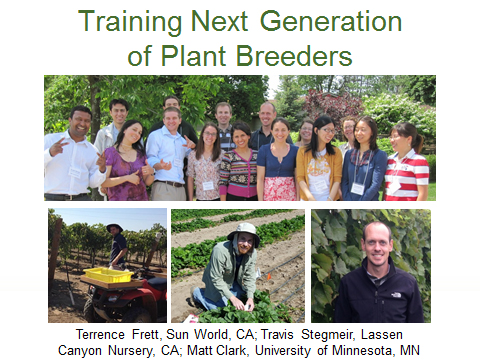ISSUE: Plant breeders who can utilize DNA information will be more efficient in developing superior new cultivars with improved fruit quality and greater productivity. Preparing future plant breeders who can integrate DNA-based knowledge and technology into their breeding programs, a process called Marker-Assisted Breeding (MAB), assures an exciting future for new cultivar development. Training of the next generation in appropriate application of state-of-the-art technologies leverages public and private investments in advanced genetics and genomics research for sustained breeding outcomes. Breeder education programs that include MAB will help meet industry needs for new breeders, in turn serving producers, packers, shippers, and sellers who will have new fruit cultivars that meet their various needs and the preferences of consumers.
WHAT HAS BEEN DONE: RosBREED’s “demonstration” apple, cherry, peach, and strawberry breeders are each training one or more graduate students. These Breeding Trainees have gained knowledge, experience, and skills in setting breeding targets, accurately measuring fruit and plant characteristics, determining trait inheritance, designing and implementing genetic tests, evaluating alternative selection strategies, and managing breeding program logistics, personnel, budgets, and timelines. A coordinated team approach is used to provide a multi-disciplinary learning experience for these students.
IMPACT: As a result of RosBREED’s investment in the next generation of plant breeders:
- Four doctoral students have graduated and an additional two doctoral students will graduate in the next two years with skills, knowledge, and experience in MAB that would not have been provided without RosBREED funding, training opportunities, and collaborative networks among breeding programs and educational institutions.
- Four Master’s students have graduated and an additional one Master’s student will graduate in the next year with similar added skills, knowledge, and experience.
- These 11 students represent a doubling in the number of students trained in these programs in the last decade. Many of their graduate education opportunities would not have existed without RosBREED support, and all of their educational experiences were greatly enriched by learning opportunities in MAB provided through the RosBREED project.
These students are prepared for the breeding jobs of the future. They have learned how to use new genetic tests to determine the best parents to combine in new crosses and to determine the best seedlings to advance through their programs. These applications reduce the costly and time-consuming need to plant , maintain for years, and thoroughly field test thousands of seedlings that are likely to have unacceptable fruit quality or growth characteristics. By using genetic tests to avoid the least promising parents and eliminate inferior seedlings early in this multi-year process, these students have learned how to focus breeding program resources where they are most likely to succeed.

